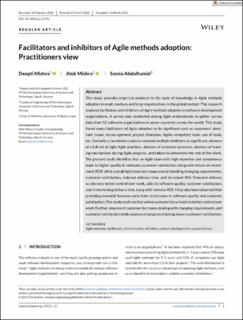| dc.description.abstract | This study provides empirical evidence to the body of knowledge in Agile methods adoption in small, medium, and large organizations in the global context. This research explores facilitators and inhibitors of Agile methods adoption in software development organizations. A survey was conducted among Agile professionals to gather survey data from 52 software organizations in seven countries across the world. This study found many facilitators of Agile adoption to be significant such as customers’ dominant issues, encouragement, project champion, highly competent team, use of tools, etc. Similarly a correlation analysis revealed multiple inhibitors as significant: absence of a full set of right Agile practices, absence of customer presence, absence of tracking mechanisms during Agile progress, and failure to determine the role of the client. The present study identifies that an Agile team with high expertise and competence leads to higher quality in software, customer satisfaction along with return on investment (ROI) while a small Agile team increases ease in handling changing requirements, customer satisfaction, reduced delivery time, and increased ROI. Frequent delivery accelerates better control over work, adds to software quality, customer satisfaction, and in shortening delivery time along with increase ROI. It has also been observed that providing essential features early leads to increase in software quality and customer satisfaction. This study confirms that active customer focus leads to better control over work. Further, absence of customer decreases dealing with changing requirements, and customer satisfaction while absence of progress tracking lowers customer satisfaction. | en_US |

